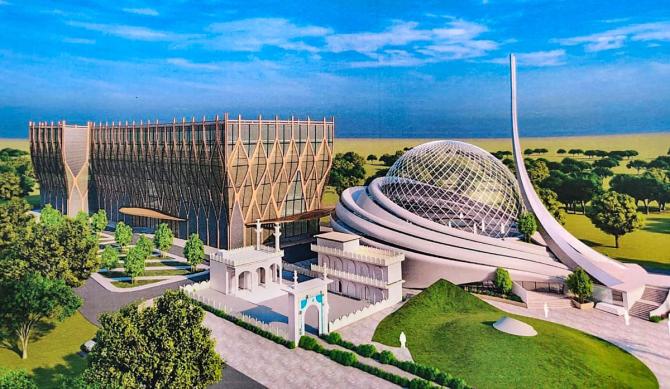With two All India Muslim Personal Law Board members terming the proposed construction of a grand mosque in Ayodhya's Dhannipur village as against the Waqf Act and Shariat laws, the Sunni Central Waqf Board on Wednesday asserted that the upcoming shrine is perfectly legal.

AIMPLB member Zafaryab Jilani on Wednesday said the proposed mosque in Ayodhya following last year's Supreme Court verdict is against the Waqf Act and 'illegal' under the Shariat laws.
"According to the Waqf Act, mosques or land of mosques cannot be bartered.
"The proposed mosque in Ayodhya violates this Act. It violates the Shariat law as the Waqf Act is based on the Shariat," said Jilani, who was also the convenor of the Babri Masjid Action Committee.
Countering Jilani's allegation that the land for the upcoming mosque in Dhannipur village was given to Muslims in exchange of the Ram Janmabhoomi site in Ayodhya, Sunni Central Waqf Board (SCWB) chairman Zufar Farooqi told PTI that it is not a bartered piece of land.
He pointed out that the land in Dhannipur village was allotted to the Uttar Pradesh Sunni Central Waqf Board in pursuance of the Supreme Court order and to take its possession the Waqf Board had to pay stamp duty.
"The Waqf Board has paid a stamp duty of Rs 9,29,400 to take possession of this land," he said.
He also said 'the land is the property of the Waqf Board but it itself is not a Waqf'.
Elaborating the concepts of Waqf and Waqf Board, the SCBA chairman said Waqf comprises a property denoted in name of Allah by a believer in Islam working for charitable purposes.
Thus only a believer of Islam can create Waqf, he said, adding Waqf Board is not an individual and it cannot create any Waqf on its own.
"The Supreme Court has not accepted Babri Masjid as Waqf, if it had accepted the land as Waqf, we would have won the case but the court clearly said the donation is not valid," Farooqi said.
He added that five acres of land given to the Waqf Board is not in the lieu of the Babri Masjid land but as a 'restitution' or relief by the apex court.
"There is no shifting of the then Babri Masjid as the Babri Masjid premises was given to Hindu party by the Supreme Court order last year. The Dhannipur land was given in ownership to Uttar Pradesh Sunni Central Waqf Board by same apex court order and it is not a Waqf land," he explained.
Farooqi is also the chairman of the Indo-Islamic Cultural Foundation (IICF) which had unveiled in its Lucknow office on Saturday the blueprint of the mosque and a hospital to be built on a five-acre plot of land in Ayodhya's Dhannipur village.
Athar Hussain, the secretary of a trust formed to build the mosque in Ayodhya, however, refuted Jillani's allegations, asserting that everyone interprets the Shariat in his own way.
When the land has been allotted under the directive of the Supreme Court, it cannot be illegal, he said.
"The power for interpretation of Shariya does not lie in the hands of some limited people.
"The mosque is the place for offering namaz. So what is wrong if we are building a mosque?" asked Hussain.
Countering Jilani's allegations, Hussain also accused him of spreading misinformation.
"Jilani Sahab is such a competent lawyer. If we are violating any Act like the Central Waqf Act, why does he not challenge it in a court of law and get our supposedly illegal acts stopped?" he asked.
"If he is not doing so, he is simply spreading misinformation and doing what is against the Shariat and teachings of Quran," he asserted.
Another executive member of AIMPLB SQR Ilyas too earlier termed the upcoming mosque as only of symbolic value, while accusing the Sunni Central Waqf Board of working under the government pressure.
"We have rejected the proposal to accept the land for the mosque at any other place. We lost the title suit and so we don't need land for a mosque," he said.
"The Muslims have rejected this land at Dhannipur given in compensation. The mosque being built by the trust constituted by the Sunni Central Waqf Board is just a symbolic one," he said.
The issue was first raised by MP Asaduddin Owaisi at a meeting of the All India Muslim Personal Law Board's executive committee held on October 13.
All the members were of the view that the exchange of land for the mosque was not permissible under the Waqf Act and in turn 'illegal' under the Shariat law.
The Ram Janambhoomi-Babri Masjid disputed structure was demolished in December 1992 by kar sevaks who claimed that the mosque in Ayodhya was built by demolishing an ancient Ram temple.
After a protracted legal tussle, the Supreme Court, on November 9 last year, ruled in favour of the construction of a Ram temple at the disputed site in Ayodhya and directed the Centre to allot an alternative five-acre plot to the Sunni Waqf Board for building a new mosque at a 'prominent' place in the holy town in Uttar Pradesh.
On the directive of the apex court, the Uttar Pradesh government allotted the five-acre plot in Ayodhya's Dhannipur for the construction of the mosque.









